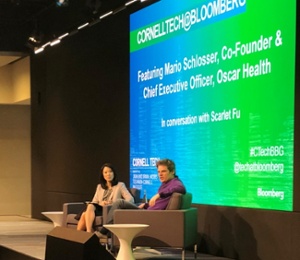Oscar Health’s Mario Schlosser at CornellTech@Bloomberg
Earlier in the year, the PANhattan team attended the latest installment of the CornellTech@Bloomberg interview series, hosted by Bloomberg Anchor and Chief Markets Correspondent Scarlet Fu. The session featured Mario Schlosser, co-founder and CEO of technology-focused health insurance company, Oscar Health.

Given recent transformations within the healthcare industry, catalyzed by rapid growth in connected personal health services, devices and data, Oscar Health is helping to reimagine aspects of healthcare access and delivery, as well as find new ways to leverage health data through new digital health practices and technologies. Led by Schlosser, Oscar Health has a central focus: making healthcare seamless and affordable for customers. Schlosser’s ultimate goal is to empower consumers with the tools necessary to make informed decisions about their own health.
It’s not dissimilar from PAN client Maestro Health, which is on a mission to make employee health and benefits people-friendly again by delivering an all-in platform that meets the needs of today’s employers, employees, brokers and carriers. Based upon market dynamics within the U.S. healthcare market, Maestro Health’s CEO, Rob Butler, identified a unique business opportunity nearly five years ago to create a comprehensive platform that would simplify the complexity and drive down costs. He believed this entire ecosystem, under one roof, would ultimately make it easier and friendlier for consumers of healthcare. His passion for people drove the founding mission for Maestro Health: to provide employee health and benefits that can be highly personalized for clients’ employees.
As an agency, we pride ourselves on working with some of the top digital health brands in the industry. We continue to see brands take the future of digital health by the horns and make it a reality.
Below are some of the top takeaways from this conversation with Schlosser.
Healthcare’s Digital Future
Schlosser kicked off the conversation by outlining two core developments: 1) the fact that insurers are now being granted member data visibility, and 2) the ability to design a network of external healthcare systems to scale Oscar Health’s own operation.
With increased visibility into members’ data, insurers can offer more personalized incentives and intervene sooner in instances of billing errors. Knowing what’s happening in near real time allows companies such as Oscar Health to engage earlier, avoid costly mistakes and remain transparent in the process.
Another key takeaway, as it relates to the future of healthcare and insurance, is the need to scale operations to onboard as many members as possible, which enables the organization to negotiate costs. Had Oscar Health kept its leasing network focused entirely on one experience, it would never have focused enough attention on building out and designing its network. For instance, the Cleveland Clinic—a nonprofit academic medical center—sees huge incentives in giving Oscar Health the most favorable rates, because claims will inevitably fall back on them. If a claim results in a loss, half of that loss would fall back on the Cleveland Clinic.
Health insurance contracts, on average, increase by 8-10 percent annually. This reflects the fact that the same benefits come at higher costs, but this does not necessarily mean that people’s salaries are increasing to offset these costs. Ken Davis, president and CEO of Mount Sinai Health, is one example of what Schlosser would consider a smart hospital executive. According to Schlosser, Davis believes in winning by building a narrowly designed network around world-class facilities and physicians who can help manage healthcare in those locations. Consumers want to be able to access best-in-class healthcare. Additionally, consumers want assurance that they’re receiving the best care at the best cost. Schlosser emphasizes that he helps make all this possible through smart partnerships and network involvement. New digital solutions help to collate the most accurate, honest information from companies like Oscar Health to make it as easy as possible for today’s tech-savvy generation to access affordable, quality care.
According to Fu, all of this has enabled Schlosser to represent a new class of “millennial hipster insurer[s].”
Evolving the Health Insurance Marketplace
In discussing how best to achieve quality care at affordable costs, Schlosser explained that there must be a balance between macroeconomic elements and personal healthcare experiences. Unless people question issues within the system, supporting evidence can remain thin due to lack of investigation. If this persists, according to Schlosser, market projections in healthcare will never force costs to align. In his word, Schlosser says it’s ridiculous for the U.S. to be spending 18 percent of GDP on healthcare, compared to countries like Switzerland, in which healthcare accounts for 11 percent of GDP and includes universal coverage and access to private hospitals. Oscar Health has since formed a model that puts pressure on new costs to deliver better cost outcomes.
Consumers value best-in-class care and will seek it out, much in the same way that they value brand names over generic ones. Schlosser claims that within ten years, nearly all U.S. healthcare systems will have to reorient themselves on a value-driven basis, addressing the steep cost curve already outlined. “It’s a journey not everyone will buy into,” he claims.
During Oscar Health’s first three years in operation, it had no members or licenses — just “a bunch of smart people and an idea,” continued Schlosser. Today, Oscar Health’s members cite the importance of quality physicians in keeping up levels of retention. Schlosser explained that physicians are not the problem when looking at how to level cost with care. He advances a different view: as long as you can build a strong network with a select group of quality care centers and hospitals, you can demonstrate to patients that they can still receive world-class care — including access to telehealth solutions — through innovative insurance alternatives.
Addressing Privacy and Regulation Concerns
Toward the end of the session, Schlosser discussed some of the political shifts in legislation over the last 18 months, which, he feels, have been some of the most interesting since the Affordable Care Act. He does admit, however, that “the insurance market has been wild and chaotic since the beginning.”
Schlosser claims that if you want to “vote without actually voting,” that you should “vote on which way the country should go on healthcare, right now. Buy insurance.” He went on to explain that there has to be a regulatory framework where people are helped more in the decision-making process. In short, we can’t control when we get sick, and it’s illogical to only purchase health insurance when you need it. Regulation over this process, he admits, was necessary; however, Schlosser emphasized that it needs to be the “right kind of regulation” in light of the issues and market elements.
Taking a New Direction
As changes sweep across the healthcare continuum, Schlosser prides himself on Oscar Health’s business model, which, he claims is “free from the need for constant reinvention.” According to Schlosser, he has always been able to show investors that they need to understand the parameters driving programs forward. Investors are patient but excited, as the company has begun underwriting profits for the first time, with an outlook that boasts increased registration in 2018 and an anticipated 20 percent drop in medical loss ratio. Schlosser also emphasizes that partnerships will be increasingly important in 2018 and beyond, pointing to examples in Clean Clinic and Humana.
With all of this in mind, Schlosser has assembled a “fully technology-driven insurance option” that has been able to double its footprint since its inception, now serving members in New York, New Jersey, California, Texas, Nashville and Ohio. Now collaborating with the Cleveland Clinic, Oscar Health has achieved its goal of partnering with best-in-class centers to deliver easy-to-access, quality and affordable healthcare options for consumers. This model – and others like it – will continue to flourish in years to come, so long as the demand for a more consumer-oriented marketplace persists.
And it already has.
Look no further than Maestro Health’s recent acquisition by global health insurance provider, AXA. Through the deal, Maestro Health is arguably furthering an even more ambitious goal than Oscar Health: transforming the U.S. health and benefits systems by simplifying the process through technology, lowering costs for all constituents, and significantly improving the healthcare experience by empowering the consumer. Much like Oscar Health, however, Maestro Health continues to invest in an even more robust platform to further reduce healthcare costs and improve engagement across the whole continuum of care.
This is an exciting time for digital health. At PAN Communications our healthcare team is working with clients across the spectrum of B2B Health IT and, more specifically, within the digital health space.
Want to take your integrated marketing and PR efforts to the next level? Check us out at www.pancommunications.com and take a look at what we’re doing in healthcare: www.pancommunications.com/healthcare.



